Artichoke herb

The benefits of artichoke herb for dogs
Artichoke herb contains many valuable ingredients, such as vitamins, minerals, fiber and phytochemicals. These can support your dog's health in various ways:
- Artichoke herb promotes liver function and helps to detoxify the body. The liver is an important organ for metabolism and blood purification. It can be burdened by various factors such as medication, environmental toxins or poor diet. Artichoke herb can protect and regenerate the liver cells.
- Artichokeherb improves fat digestion and lowers cholesterol levels. The artichoke contains a bitter substance called cynarin, which stimulates the production of bile. This is necessary for the breakdown of fats in the intestine. Cynarin also inhibits the synthesis of cholesterol in the liver and promotes its excretion.
- Artichoke herb has an antioxidant and anti-inflammatory effect. The artichoke also contains other secondary plant substances such as flavonoids and polyphenols, which can neutralize free radicals. Free radicals are harmful molecules that can cause cell damage. They are caused by stress, ageing or illness. Antioxidants can strengthen the immune system and reduce inflammation.
The disadvantages of artichoke herb for dogs
Although artichoke herb is healthy for dogs, it is not without risks. There are a few points you should be aware of:
- Artichokeherb can cause allergic reactions. If your dog is sensitive to composite plants, such as chamomile or marigold, he may also be allergic to artichoke. Symptoms may include itching, skin rash or breathing difficulties. In this case, you should consult a vet immediately.
- Artichoke herb can cause diarrhea. If your dog eats too much artichoke or eats it too quickly, it can develop gastrointestinal problems. This is because the fiber in the artichoke herb stimulates the intestines and binds more water. To avoid this, you should only give your dog small amounts and increase them slowly.
- Artichokeherb can reduce milk production. If you have a nursing dog, you should not feed her artichokes. The cynarin in the artichoke herb can inhibit milk production and thus endanger the offspring.
How do you feed your dog artichoke herb?
If you want to do something good for your dog and give him a change from time to time, you can give him some artichoke herb. There are various ways in which you can do this:
- You can buy artichoke herb as a powder or cut up and mix it into the food. The recommended dosage is around one teaspoon per 10 kg of body weight per day. However, you should always follow the manufacturer's instructions and slowly work your way up to the right amount.
- You can also dry and chop artichoke herb yourself. To do this, you need fresh artichoke leaves, which you should wash and dry thoroughly. Then place them on a baking tray and put them in the oven at a low temperature (around 50°C). After a few hours, they will be dry and crispy. Then you can process them into a powder in a blender or food processor or crumble them by hand.
- You can also offer your dog fresh or cooked artichokes as a snack. However, you should only use the soft inside of the leaves and remove the hard stem. You should also make sure that the artichoke does not contain any spices or sauces that could be harmful to your dog.
As with any new food, you should observe how your dog reacts to artichoke herb. If he tolerates it well and likes to eat it, you can give him some more often.
Artichoke herb is a healthy vegetable for dogs that has many positive effects on the liver, digestion and immune system. However, it can also have some disadvantages, such as allergic reactions or lactation inhibition in lactating bitches. Therefore, you should always be careful when feeding your dog something new and stick to the recommended amounts.
Properties 5
Are you looking for other ingredients with a specific property?
Just click on them to find more.
If you notice any signs of hypersensitivity or poisoning in your dog, you should see your vet immediately. We are not a substitute for a vet, but we try to be as accurate as possible. Every dog reacts differently and we recommend you get a second opinion or consult your vet if in doubt.
Stay healthy and take good care of your four-legged friend!😊
Similar to Artichoke herb
Dandelion herb belongs to the daisy family and is widespread in Europe, Asia and North America. The plant has a high content of vitamins, minerals, trace elements and bitter substances. It has a...
Stinging nettles are herbaceous plants from the nettle family. They grow in Europe, Asia and North America and prefer moist, nutrient-rich locations. The best-known species are the common nettle...
Yarrow herb has many positive effects on your dog's health. Among other things, it can: Promote digestion and relieve flatulenceStimulate blood circulation and stabilize the circulatory...
Milk thistle, also known as Silybum marianum, is a flowering plant that belongs to the Asteraceae family. The plant is known for its therapeutic properties, particularly for supporting liver...



